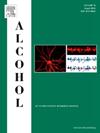Hippocampal overexpression of tissue-type plasminogen activator “tPA” attenuates social defeat-induced depression and ethanol related behavior in mice
IF 2.9
4区 医学
Q3 PHARMACOLOGY & PHARMACY
引用次数: 0
Abstract
Depression and anxiety disorders are often exacerbated by social stress, necessitating the exploration of molecular mechanisms underlying stress resilience. Tissue plasminogen activator (tPA), a serine protease with pleiotropic effects in the brain, plays a critical role in modulating neuroplasticity and stress responses. This study investigates the behavioral and molecular effects of tPA gain-of-function in a social stress paradigm in male C57BL/6 mice using lentiviral vectors. Behaviorally, hippocampal tPA gain-of-function mitigated depression-like responses in the novelty-suppressed feeding, sucrose splash, tail suspension, and forced swim tests following exposure to chronic social stress. Additionally, in a two-bottle choice drinking paradigm, tPA overexpression reduced social stress-induced ethanol intake and preference, suggesting a role in dampening maladaptive coping behaviors. However, analysis of tastants’ intake and preference revealed no significant effects of tPA overexpression, indicating that it does not influence hedonic responses under stress conditions. Molecularly, tPA overexpression preserved hippocampal tPA mRNA expression and maintained levels of mature brain-derived neurotrophic factor in the hippocampus despite chronic stress exposure. These findings highlight the potential neuroprotective effects of tPA in maintaining hippocampal plasticity and mitigating stress-induced dysregulation of critical neurotrophic pathways. Collectively, this study underscores the potential of tPA as a therapeutic target for stress-induced mood and substance use disorders by modulating behavioral and neurobiological responses to chronic social stress.
海马组织型纤溶酶原激活物“tPA”的过度表达减轻了小鼠社交失败诱导的抑郁和乙醇相关行为。
社会压力往往会加剧抑郁和焦虑障碍,因此有必要探索压力恢复能力的分子机制。组织纤溶酶原激活物(Tissue plasminogen activator, tPA)是一种在大脑中具有多效作用的丝氨酸蛋白酶,在调节神经可塑性和应激反应中起着重要作用。本研究利用慢病毒载体研究了雄性C57BL/6小鼠在社会应激模式下tPA功能获得的行为和分子效应。行为上,海马tPA功能获得在暴露于慢性社会压力后的新奇抑制进食、蔗糖飞溅、悬尾和强迫游泳测试中减轻了抑郁样反应。此外,在两瓶选择饮酒范式中,tPA过表达降低了社会压力诱导的乙醇摄入和偏好,表明其在抑制适应不良应对行为中起作用。然而,对味觉剂摄入量和偏好的分析显示,tPA过表达没有显著影响,表明它不影响应激条件下的享乐反应。从分子上讲,尽管慢性应激暴露,但tPA过表达保留了海马tPA mRNA的表达,并维持了海马成熟脑源性神经营养因子的水平。这些发现强调了tPA在维持海马可塑性和减轻应激诱导的关键神经营养通路失调方面的潜在神经保护作用。总的来说,本研究强调了tPA通过调节对慢性社会压力的行为和神经生物学反应,作为应激性情绪和物质使用障碍的治疗靶点的潜力。
本文章由计算机程序翻译,如有差异,请以英文原文为准。
求助全文
约1分钟内获得全文
求助全文
来源期刊

Alcohol
医学-毒理学
CiteScore
4.60
自引率
4.30%
发文量
74
审稿时长
15.6 weeks
期刊介绍:
Alcohol is an international, peer-reviewed journal that is devoted to publishing multi-disciplinary biomedical research on all aspects of the actions or effects of alcohol on the nervous system or on other organ systems. Emphasis is given to studies into the causes and consequences of alcohol abuse and alcoholism, and biomedical aspects of diagnosis, etiology, treatment or prevention of alcohol-related health effects.
Intended for both research scientists and practicing clinicians, the journal publishes original research on the neurobiological, neurobehavioral, and pathophysiological processes associated with alcohol drinking, alcohol abuse, alcohol-seeking behavior, tolerance, dependence, withdrawal, protracted abstinence, and relapse. In addition, the journal reports studies on the effects alcohol on brain mechanisms of neuroplasticity over the life span, biological factors associated with adolescent alcohol abuse, pharmacotherapeutic strategies in the treatment of alcoholism, biological and biochemical markers of alcohol abuse and alcoholism, pathological effects of uncontrolled drinking, biomedical and molecular factors in the effects on liver, immune system, and other organ systems, and biomedical aspects of fetal alcohol spectrum disorder including mechanisms of damage, diagnosis and early detection, treatment, and prevention. Articles are published from all levels of biomedical inquiry, including the following: molecular and cellular studies of alcohol''s actions in vitro and in vivo; animal model studies of genetic, pharmacological, behavioral, developmental or pathophysiological aspects of alcohol; human studies of genetic, behavioral, cognitive, neuroimaging, or pathological aspects of alcohol drinking; clinical studies of diagnosis (including dual diagnosis), treatment, prevention, and epidemiology. The journal will publish 9 issues per year; the accepted abbreviation for Alcohol for bibliographic citation is Alcohol.
 求助内容:
求助内容: 应助结果提醒方式:
应助结果提醒方式:


